
Placental abruption is a serious condition that can affect pregnant women, but what exactly is it? Placental abruption occurs when the placenta detaches from the uterus wall before childbirth. This can cause severe complications for both the mother and baby. Understanding the signs, risks, and treatments is crucial for expecting parents. Did you know that placental abruption can lead to premature birth or even stillbirth? It's essential to recognize symptoms like vaginal bleeding, abdominal pain, and rapid contractions. While the exact cause remains unknown, factors like high blood pressure, trauma, and substance abuse can increase the risk. Early detection and medical intervention can make a significant difference. Let's delve into 50 important facts about placental abruption to better understand this critical condition.
Key Takeaways:
- Placental abruption is a serious condition during pregnancy, occurring in about 1 in 100 pregnancies, and can lead to severe complications for both the mother and baby. Early recognition and proper management are crucial.
- Understanding the causes and risk factors of placental abruption can help in preventing it. Managing high blood pressure, avoiding smoking and drug use, and ensuring proper nutrition are important measures for a healthy pregnancy.
What is Placental Abruption?
Placental abruption is a serious condition during pregnancy where the placenta detaches from the uterus wall before childbirth. This can lead to severe complications for both the mother and baby. Understanding this condition is crucial for expecting parents.
- Placental abruption occurs in about 1 in 100 pregnancies.
- It usually happens after the 20th week of pregnancy.
- The placenta provides oxygen and nutrients to the baby.
- Early detachment can deprive the baby of essential nutrients.
- Symptoms include vaginal bleeding, abdominal pain, and back pain.
- Risk factors include high blood pressure, trauma, and smoking.
- Women with a history of placental abruption are at higher risk.
- Cocaine use during pregnancy increases the risk.
- Multiple pregnancies (twins, triplets) can also be a risk factor.
- Advanced maternal age (over 35) is another risk factor.
Symptoms and Diagnosis
Recognizing the symptoms early can help in managing the condition effectively. Diagnosis often involves a combination of physical exams and imaging tests.
- Vaginal bleeding is the most common symptom.
- Abdominal pain can range from mild to severe.
- Uterine tenderness is often present.
- Rapid contractions may occur.
- Fetal heart rate abnormalities can be detected.
- Ultrasound is used to diagnose placental abruption.
- Blood tests can help assess the severity.
- Monitoring the baby's heart rate is crucial.
- MRI may be used in complex cases.
- Early diagnosis improves outcomes for both mother and baby.
Causes and Risk Factors
Understanding the causes and risk factors can help in preventing placental abruption. Some factors are within control, while others are not.
- High blood pressure is a leading cause.
- Trauma to the abdomen can trigger abruption.
- Smoking during pregnancy increases the risk.
- Previous placental abruption raises the likelihood.
- Blood clotting disorders can contribute.
- Premature rupture of membranes is a risk factor.
- Short umbilical cord may lead to abruption.
- Uterine infections can be a cause.
- Polyhydramnios (excess amniotic fluid) is another risk.
- Poor nutrition during pregnancy can increase the risk.
Treatment and Management
Managing placental abruption involves immediate medical attention. Treatment varies depending on the severity and stage of pregnancy.
- Mild cases may require bed rest and monitoring.
- Severe cases often need immediate delivery.
- Blood transfusions may be necessary.
- Intravenous fluids help maintain blood pressure.
- Oxygen therapy can support the baby.
- Medications may be used to manage contractions.
- Corticosteroids help mature the baby's lungs if early delivery is needed.
- Continuous fetal monitoring is essential.
- Cesarean section is common in severe cases.
- Postpartum care includes monitoring for complications.
Prevention and Prognosis
While not all cases can be prevented, certain measures can reduce the risk. Understanding the prognosis helps in preparing for potential outcomes.
- Regular prenatal care is crucial.
- Managing high blood pressure reduces risk.
- Avoiding smoking and drug use is important.
- Proper nutrition supports a healthy pregnancy.
- Avoiding trauma to the abdomen is essential.
- Early detection and treatment improve outcomes.
- Most mild cases have a good prognosis.
- Severe cases can lead to preterm birth.
- Maternal complications include hemorrhage and shock.
- Long-term follow-up may be needed for both mother and baby.
Final Thoughts on Placental Abruption
Placental abruption is a serious condition that requires immediate medical attention. Knowing the symptoms and risk factors can make a huge difference in outcomes for both mother and baby. Early detection and prompt treatment are key to managing this condition effectively. If you suspect any issues during pregnancy, don't hesitate to contact your healthcare provider. Regular prenatal care plays a crucial role in monitoring the health of both mother and child, helping to catch potential problems early. Understanding the importance of prenatal visits and being aware of any unusual symptoms can help ensure a safer pregnancy journey. Stay informed, stay vigilant, and always prioritize your health and well-being. By doing so, you can better navigate the challenges that may arise and ensure the best possible outcome for you and your baby.
Frequently Asked Questions
Was this page helpful?
Our commitment to delivering trustworthy and engaging content is at the heart of what we do. Each fact on our site is contributed by real users like you, bringing a wealth of diverse insights and information. To ensure the highest standards of accuracy and reliability, our dedicated editors meticulously review each submission. This process guarantees that the facts we share are not only fascinating but also credible. Trust in our commitment to quality and authenticity as you explore and learn with us.
